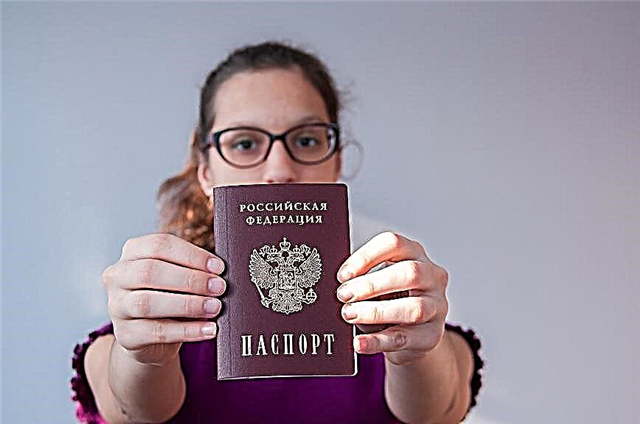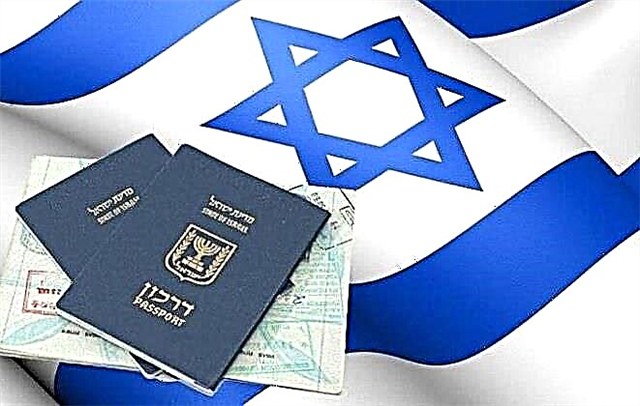Israeli citizenship is a political and legal relationship between the Israeli state and its citizens, expressed in the mutual rights and obligations of the parties. It is generally accepted that only Jews can apply for an Israeli passport. For persons of Jewish nationality, a simplified procedure for obtaining citizenship is provided, but this does not mean that representatives of other nationalities and confessions will not be able to apply for the Israeli indigenate (citizenship).

Who is eligible for Israeli citizenship
Everyone who can become an Israeli citizen is strictly defined by the Citizenship Law of 1952 (חוק האזרחות). In accordance with Art. 1 of the law, the right to a passport (darkon) arises:
- by virtue of repatriation, including from those who returned to Israel in accordance with the Law on Returns No. 5710-1950 of 07/06/1950 (חוק השבות);
- by virtue of residence, that is, those who at the time of the formation of the state lived on its territory. As such, the law on Israeli citizenship recognizes everyone who was registered, actually lived or entered the country before the entry into force of this law, even if this happened after the proclamation of independence;
- by birth, if at least one of his parents is an Israeli citizen, regardless of the place of birth. It turns out that the citizenship of Israel at the birth of a child is automatically transferred to him, even if his father is an Israeli (Jewish nationality is transmitted only through the maternal line);
- by naturalization - for persons who have been living in the country for a long time, intend to settle and link their fate with it, and at the same time have lost their political and legal connection with any other state. For spouses of Israelis, as well as some other categories of persons, simplified naturalization is provided.
- by virtue of adoption. Israeli citizenship through adoption arises for all minors adopted by Israelis;
- by virtue of the granting of a passport by the head of the Ministry of Internal Affairs as a privilege.
Rights and obligations of citizens of Israel
During the existence of the Israeli state, the authorities did not succeed in adopting the Constitution in the form of a formal single document, and therefore the rights and obligations of citizens are determined by a set of other normative acts called the "Basic Laws of Israel" (חוקי היסוד של ישראל).
To begin with, let's consider what Israeli citizenship gives to persons who decide to enter it and issue an Israeli passport. In accordance with the Basic Law on Human Dignity and Freedom (חוק-יסוד: כבוד האדם וחירותו), the rights of an Israeli citizen are based on the recognition of his value, the sanctity of his life and freedom. The main purpose of the law is to protect human dignity and demonstrate that Israel is a democratic state.
Thus, if a citizen of the Russian Federation obtains Israeli citizenship, he will have the right to:
- to protect life, property and personal freedom;
- privacy and its inviolability;
- freedom of movement, the ability to freely cross Israeli borders and reside in the country at any time;
- to freedom of expression, that is, the right to choose and be elected to government bodies;
- to diplomatic protection while on the territory of another state
- apply for Israeli citizenship for a Russian spouse and children;
- to the freedom to choose a field of activity, work and profession, as well as to unimpeded employment (Basic Law on Freedom of Employment, חוק-יסוד: חופש העיסוק)
- to legal protection and freedom of participation in political organizations;
- to preserve the language and cultural traditions;
- housing, education, medical care, retirement, protection from persecution.
It is important to remember that many civil rights are not legally enshrined in Israel, which leads to frequent violations. At the same time, everyone who has the right to Israeli citizenship should remember about the complex of obligations imposed on citizens. They apply equally to all residents of the country. It is customary to include among the main responsibilities of citizens:
- conscientious residence and legal compliance;
- observance of loyalty to the state, which, in particular, is expressed in the obligation of every citizen (from 18 to 29 years old) to serve in the army and in the obligation to refuse assistance to any state recognized as an enemy of Israel;
- the obligation to carry an identity card with you and present it to the authorities upon request;
- duty to pay taxes and social charges and so on. This does not apply to those who received Israeli citizenship without moving and are not resident in the country.
Please note that in Israel any person is obliged to be a good citizen. He works to improve the life of society, participates in the life of the country through personal donation.
This is done in a variety of ways. For example, schoolchildren participate in a personal commitment project, helping the elderly and those in need in various ways, adults volunteer to participate in humanitarian organizations.
All this must be taken into account before becoming a citizen of Israel: the scope of rights and obligations does not depend on the method of obtaining an Israeli passport. It's time to dwell in more detail on the main methods of acquiring it available to foreigners.
The procedure and methods for obtaining an Israeli identity
Immediately, we note: in each case, the procedure for issuing an Israeli passport is radically different. There are several common ways for a Russian citizen to obtain Israeli citizenship, among them:
- marriage with a citizen of the country;
- repatriation, including through conversion;
- naturalization.
Each of the methods differs both in the procedure and in the requirements for applicants. For example, persons who have married a citizen of the state, as well as those who plan to naturalize as a result of long-term residence, can obtain Israeli citizenship at the local migration service under the Ministry of Internal Affairs (שירות ההגירה של ישראל).

Repatriates issuing a passport in a simplified manner can receive it both by decision of the Israeli diplomatic mission in the Russian Federation (for a Belarusian in Belarus, for a Ukrainian in Ukraine), and directly through the Ministry of Internal Affairs already on Israeli territory. In addition to the conditions and order, the required package of documents will also differ; what documents are needed to obtain Israeli citizenship in each of the ways, we will consider below.
In any case, the final result is determined by the responsible competent authority - the embassy or the Ministry of Internal Affairs. Consideration of the application in each case is individual and takes a considerable period of time, up to 6 months.
If the person meets the requirements and no obstacles for issuing a passport are identified, he / she receives a notification of Israeli citizenship. From now on, you can get Israeli documents.
If obstacles are identified, the competent authority sends the applicant a denial of citizenship, which he has the right to appeal in court. We will describe the reasons for the refusal below. Now we propose to consider the features of each method in more detail.
Marriage to an Israeli
In accordance with Art. 7 of the law on citizenship, a marriage in Israel or outside the country, concluded by a foreigner with an Israeli, is the basis for providing the foreign spouse with an Israeli indigenous. However, the passport is not automatically issued.The spouses will have to go through a lengthy bureaucratic procedure, which, according to the most conservative estimates, will take several years.
Here's what a spouse of a citizen needs to obtain Israeli citizenship:
- Obtain a B1 visa with the right to work.
- After 6 months - pass an interview and issue a temporary resident ID.
- Renew your identity card annually, as it is only valid for 12 months.
- After the expiration of the 4th year of residence as a temporary resident, apply for citizenship.
Further, in order to obtain Israeli citizenship for a citizen of the Russian Federation, the spouse of an Israeli, it is necessary to submit a package of documents, including:
- application for citizenship;
- temporary residence permit;
- the applicant's foreign passport and the Israeli passport of the second spouse;
- marriage certificate (if issued in the Russian Federation - translation and apostille);
- other documents confirming that the marriage is not fictitious (general photos, testimony of witnesses).
Conversion to Judaism
Conversion is a procedure for accepting Judaism through religious structures, including outside Israel. It is impossible to accept Judaism without communication with the rabbi, who will teach the future Jew and instruct him in every possible way. He, like his friends, who honor the Torah and its commandments, will have to give the Chief Rabbinate in the Russian Federation recommendations about a person who wants to undergo conversion.
The process of passing involves several stages:
- Opening a personal file. The candidate is interviewed for the first time and (if necessary) an exam on the subject of knowledge of the Torah and observance of its commandments.
- Interim observation - the second meeting, which is held on the recommendation of the supporting rabbi, if the applicant has a sufficient level of knowledge and leads him to an appropriate lifestyle.
- Session of the rabbinical court, where 3 rabbis examine and interview the applicant. A year after conversion, if there are sufficient recommendations, the person receives a conversion certificate confirming his entry into Judaism.
Such a person is recognized as a Jew, which allows a Russian to obtain Israeli citizenship as a repatriate in accordance with the law on return. Along with the Jews who passed the conversion, other Jews also have the right to repatriation.
Repatriation
In accordance with Israeli law, the right to repatriation is vested in:
- Halachic Jews, that is, those who were born of a Jewish mother;
- those who passed conversion and abandoned another religious denomination or did not belong to any;
- persons born abroad, regardless of religion, if at least one of their parents is an Israeli citizen born on its territory.
Repatriation to Israel is a simplified way of obtaining citizenship, which allows you to relatively quickly move to the Promised Land (within six months from the date of submission of documents to the embassy), receive a passport, housing and many benefits, depending on the chosen program. To participate in these, applicants need to obtain approval from the embassy.
To become an Israeli citizen, a Russian must submit a list of documents:
- documents confirming Jewish roots (or a certificate of conversion), and documents of kinship with Jewish relatives;
- visa application form;
- documents on the current marital status;
- educational documents (school certificate, university diploma);
- documents on qualifications and work experience (work book);
- police clearance certificate;
- identity cards of close relatives who are Israeli citizens;
- photo 3 x 4 cm and other documents.
Naturalization
An exhaustive answer to the question of whether it is possible for a non-Jew to obtain Israeli citizenship is given in Art. 5 of the law on citizenship: it is possible, by way of naturalization. Naturalization (התאזרחות) refers to the process of long-term residence in the country legally during the period established by law and obtaining authorization for citizenship from the competent government authorities.

The law provides for the following requirements and conditions for obtaining Israeli citizenship by naturalization:
- being in Israel at the time of application;
- stay in Israel for the last three out of five years preceding the filing of the application;
- the presence of a permanent residence permit issued no earlier than 4.5 years from the date of entry into the country;
- knowledge of Hebrew at a sufficient level (level of preparation in the ulpan);
- intention to reside permanently in the country;
- refusal of the existing passport.
Naturalization is the only way (apart from marriage) to obtain Israeli citizenship without repatriation. Obtaining a passport in accordance with the above steps requires patience, a complex and lengthy bureaucratic process. And there are no guarantees that, having fulfilled all the conditions, the person will receive approval from the leadership of the Ministry of Internal Affairs - Art. 5 of the law allows you to depart from them and refuse to provide an indigenous person. Even having legally lived for 3 years out of the last 5 with a residence permit (the minimum period for how long you need to live in Israel to obtain citizenship), many applicants are refused.
Article 6 of the law provides for a number of categories exempted from the fulfillment of the listed conditions, including: persons who served in the Israeli army, children of army soldiers who died in the service, and some others. In addition, on the recommendation of the head of the Ministry of Internal Affairs, some persons may be fully or partially exempted from fulfilling these conditions. All that is needed to obtain Israeli citizenship in this case is a letter from the Minister of the Ministry of Internal Affairs.
Applicants who have received a passport through naturalization enjoy the full range of civil and political rights of Israelis. However, they do not acquire the right to benefits, financial assistance and benefits from the state for repatriates.
Is it possible to obtain Israeli citizenship without residence
With all that said, the only way to obtain Israeli citizenship without residency is through repatriation. All native Jews, if they have proof of Jewish origin, receive approval and a visa from the embassy to enter the country and can receive an Israeli passport immediately after entry. Previously, a mandatory period of residence of 1 year was established for them, but today it has been canceled.
All other methods of obtaining citizenship require compulsory residence.
How to confirm Jewish roots
For the approval of repatriation, a prerequisite is documentary confirmation of Jewish nationality through the female line (mother, grandmother). How to find Jewish roots is an ambiguous question, you must use all possible sources:
- This can be proved by providing a birth certificate of the mother / grandmother / great-grandmother, marriage / death / divorce certificates, which will indicate the nationality - Jewish.
- You can submit extracts from the house book or documents from the archive of the registry office, which reflects the Jewish nationality. Photos from the family archive or other documents with Jewish symbols can indirectly prove Jewishness.
- If such searches were unsuccessful, you can contact specialized organizations for research, for example, the Institute of History of the National Academy of Sciences in Belarus. The cost of such research can be impressive, but it is a reasonable price to pay for the right to be united with the homeland.
- You can also provide proof of roots at the place of burial of relatives (Jewish cemeteries).
Interview at the embassy
If you find Jewish roots, you must make an appointment with the consul. To become an Israeli citizen, a Russian must contact the repatriation department at the local Israeli embassy, the address of which can be found here.
During a personal interview, the consul will take the applicant's documents, find out what is the reason for the desire to move, and conduct a preliminary check of Jewish roots and documents.
Based on the results of the interview and further verification of documents, within 6 months the applicant will receive a notification of the decision taken: if it is positive, he will be issued an Israeli visa with a duration of 6 months.

What to do next
The actions of the repatriate after the approval of repatriation by the consul include:
- Communication with the Jewish Agency (“Sokhnut”) and selection of a suitable repatriation program, obtaining other assistance from the organization.
- Choosing the date of moving, booking a free air ticket with the help of "Sokhnut".
- Flight to Israel, where the repatriate is met by representatives of the Ministry of Aliyah and Absorption and issued an Israeli passport or identity card, first aid, and other important documents.
- The first steps upon arrival: searching for housing, opening a bank account, taking out insurance, enrolling in Hebrew courses, connecting a mobile operator, and so on. A local curator is assigned to each repatriate, who will help him with the initial adaptation.
- Registration of a passport. Since a special biometric photo must be taken to verify the identity in the country, an Israeli passport may not always be issued at the airport. If this did not happen immediately, contact your local Ministry of Internal Affairs.
Israel's Attitude Toward Bipatrism
In accordance with Art. 14 of the Citizenship Law, the only case when a person is obliged to renounce an existing second citizenship is naturalization. In all other cases, foreigners have the right to keep their old passport when receiving an Israeli one.
However, in relations with the state, a bipatrid will be considered exclusively as an Israeli. Acquisition of foreign citizenship by him also will not entail deprivation of Israeli citizenship, if this does not contradict the laws of the country.
Denial of Citizenship
The Israeli embassy and the Ministry of Internal Affairs do not always approve of applicants' applications for a passport. The reasons for refusal are usually:
- unproven Jewish origin;
- insufficient relationship with a Jewish relative;
- the presence of an outstanding criminal record;
- submission of falsified documents;
- suspicion of a fictitious marriage and so on.
The reason for the refusal in any case must be stated in writing and communicated to the applicant. If the refusal is based on an error or is not justified, the applicant has the right to appeal it directly to the embassy, the Ministry of Internal Affairs or the Israeli High Court of Justice, depending on the situation.
Conclusion
Finally, consider the pros and cons of Israeli citizenship. Let's start with the benefits:
- the opportunity to obtain a passport under the repatriation program without prior residence and renunciation of Russian citizenship;
- the right to benefits and cash assistance;
- the right to visa-free travel to 145 countries of the world;
- high standard of living, social support, effective medicine and so on.
But there are also some disadvantages, in particular:
- a ban on working in the civil service in the Russian Federation;
- a ban on entry to some countries, for example, Iraq, Iran, UAE;
- conscription for citizens under 22 years of age.











